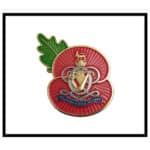Frank Turner, who died on 27 March 1990, was one of that considerable number of well-educated German Jews who, recognising the evil behind Hitler’s politics, made his way out of Germany before it was too late and in due course, after working for a time in London, joined the British Army.
Born as World War 1 ended, the whole of his upbringing was influenced by the resurgence of post-war Germany, leading to the rise of Nazi domination.
In England he had to fend for himself, having lost his mother and sister who, deported to Poland, were swallowed up by the holocaust.
He struggled through the early years of World War 2 in some menial jobs until being accepted for the Army in 1943.
His education no less than his stalwart character gained him entry into the RAC, and after attending the OCTU at Sandhurst was commissioned in January 1945, posted to the BLA and joined the 8th Hussars in March.
Frank was immediately accepted as a conscientious, reliable and loyal soldier, and in the short time until the end of the war, he made a valuable contribution to the operations of the Regiment as its Intelligence Officer.
In this post he was ideally suited, his English being as good as his German, his quiet dignity and firmness of manner made him invaluable as they advanced to the Elbe.
Almost as the last shots were being fired he had one moment of personal satisfaction. In the small village of Elsdorf, not far from Hamburg, he found a public telephone that was working and asked for the Burgermeister of that much-battered city. Much to his surprise, he was put through and, explaining the situation, was passed on to General Wolz, the garrison commander, to whom he suggested the surrender of the city.
The General, finding how junior Frank was, said he could only deal with a senior officer; this was arranged through 7th Armoured Division HQ and led rapidly to the scene on Luneburg heath where, on 9 May, Field Marshal Montgomery and Admiral Donitz put their signatures to the Instrument of Surrender of all the German forces and the end of World War 2 in Europe.
By now Frank was a completely integrated 8th Hussar, and his authority and ability made him invaluable in the many early post-war problems, such as the screening of the many hundreds of German troops marching South out of Denmark to POW camps.
Later that year he accompanied the Regimental Advance Party to Berlin, prior to the Division arriving there, and was one of the first ‘Westerners to enter Hitler’s bunker in the Reichskanzlei and to examine the bonfire site nearby on which Hitler’s body was cremated.
He served until mid-1946 when he was released and joined the City of London Yeomanry (The Sharpshooters), with whom he served until 1958 becoming a Major, finally ceasing to be on the RARO in 1968.
He worked in a number of jobs in industry and for his last firm helped to set up export agencies all over the world.
His company reported that he had travelled over a million miles on their behalf, and his fluent knowledge of six languages as well as his impressive ambassadorial qualities was of immense value.
To the end, Frank kept his loyalty to the Regiment and the friends he had made during his brief service.
He regularly attended Dinners, Old Comrades’ Reunions and other occasions, and will long be remembered for his chivalry, his generosity and his kindness which motivated his philosophy after the war, that the time of destruction was over and that he must help in every way the rebuilding of the future.



